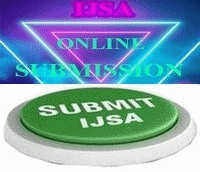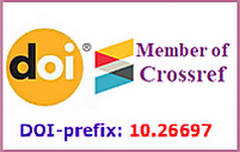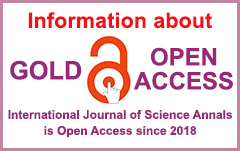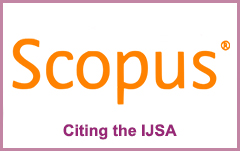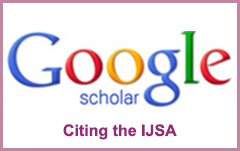EDITING AND REVIEWING PROCESS
of INTERNATIONAL JOURNAL OF SCIENCE ANNALS
(description of quality control system)
DOI: https://doi.org/10.26697/ijsa.2.3
Base URL: https://ijsa.culturehealth.org/index.php/en/editorial-board/editing-and-reviewing-process
Base URL: https://ijsa.culturehealth.org/index.php/en/editorial-board/editing-and-reviewing-process
REVIEW PROCEDURE
All manuscripts submitted for publication the INTERNATIONAL JOURNAL OF SCIENCE ANNALS (IJSA) are peer reviewed.
Manuscripts of the IJSA Editorial Board Member are submitted to the review process on general terms.
Each participant in the review process – Author, Reviewer or Editor – is required to declare a possible conflict of interest so that the publisher anticipates the possibility of such influence.
The Editorial Office strives to exclude conflicts of interest between Authors and Reviewers.
Editing and reviewing process. More
The review procedure for manuscripts involves the following steps:
I. Evaluation of the manuscript by a member of the Editorial Board.
All manuscripts are first reviewed by the IJSA Technical Editor to evaluate their relevance to the Journal’s directions and requirements. Incomplete materials or manuscripts that do not meet these guidelines are returned to the Author(s) with suggestions for correction. The Authors will be notified by a corresponding letter after the manuscript has been registered in the Editorial Office.
The Editor-in-Chief or Editor of IJSA reads every submitted manuscript and assigns a general priority level:
(1) the manuscript is sent to Reviewers immediately;
(2) the manuscript is returned to the Authors with suggestions for correction of the submitted data;
(3) the manuscript is rejected.
Editors analyze the revised manuscript. If the manuscript meets the IJSA requirements, it will be sent to two (or more) Reviewers for analysis and the Statistical Editor if it contains numerical data.
II. The manuscript is then submitted for review to an independent experts in the relevant field. This is where double-blind reviewing is used (double-blind review – neither the Author nor the Reviewer know each other). We promise to conceal always the identity of both the Reviewers and the Author from both the parties.
To facilitate this steps of peer review, authors must ensure that their manuscripts are prepared in such a way that they do not disclose the identity of the author. Please provide the following information when submitting the materials: submit a cover page containing information about the authors, and a "manuscript" without any details about the author as 2 separate files.
Reviewing the manuscript, the Reviewers recommend:
(1) Accept without revision;
(2) Accept after revision;
(3) Reject.
Evaluation Process Time:
The preliminary evaluation process usually takes 1 - 2 weeks.
The evaluation process by reviewers (and the statistical editor) can take from 1 to 2 months.
The preliminary evaluation process usually takes 1 - 2 weeks.
The evaluation process by reviewers (and the statistical editor) can take from 1 to 2 months.
Publication Frequency
Articles are published online as soon as they are available (peer-reviewed and copy-edited). The Journal collates them into archival print “numbers” (two per year: June, December) and “volumes” (one per year).
How many manuscripts are rejected, and what are the reasons for the rejection of publication
In 2025, the Editorial Office received 103 manuscripts, of which 13 were published, and 90 were rejected.
Articles are published online as soon as they are available (peer-reviewed and copy-edited). The Journal collates them into archival print “numbers” (two per year: June, December) and “volumes” (one per year).
How many manuscripts are rejected, and what are the reasons for the rejection of publication
In 2025, the Editorial Office received 103 manuscripts, of which 13 were published, and 90 were rejected.
In 2024, the Editorial Office received 123 manuscripts, of which 14 were published, and 109 were rejected.
In 2023, the Editorial Office received 119 manuscripts, of which: 14 were published, 105 were rejected.
The average number of rejected manuscripts is 85%, of which:
40% are rejected during the preliminary evaluation process;
45% are rejected during the peer review process.
At the first stage, the reasons for rejection are: the guidelines of the study have not been followed, the manuscript title is out of scope of the journal, manuscript requirements have not been followed, the manuscript contains stylistic, spelling and syntax errors, plagiarism, etc.
At the second stage, the reasons for rejection are: scientific relevance and practical importance are absent, methodological errors, there is no logic between the sections of the manuscript, etc.
40% are rejected during the preliminary evaluation process;
45% are rejected during the peer review process.
At the first stage, the reasons for rejection are: the guidelines of the study have not been followed, the manuscript title is out of scope of the journal, manuscript requirements have not been followed, the manuscript contains stylistic, spelling and syntax errors, plagiarism, etc.
At the second stage, the reasons for rejection are: scientific relevance and practical importance are absent, methodological errors, there is no logic between the sections of the manuscript, etc.
Manuscript Evaluation Process (Reviewer Evaluation Form)
All manuscripts that have been submitted to the Editorial Board go through a peer review procedure. The Reviewers fill out the Reviewer Evaluation Form, which they submit to the IJSA Editorial Review Board.
In case of disagreement between reviewers, the matter is resolved by the IJSA Editor-in-Chief.
Reviewers have the opportunity for validation of their reviews in Clarivate (Web of Science).
Authorship Statement (Author Agreement Form)
All authors complete the Author Agreement Form, which must be completed, signed and submitted with the manuscript. Thus, the authors confirm the originality of the manuscript, authorship, assignment, and assert adherence to the review process, that is, they will not remove the manuscript. Completed Agreement Forms must be sent, otherwise the editorial editing of the manuscript may be delayed.
Conflict of interests (Conflict of Interest Declaration)
All authors complete the Conflict of Interest Declaration. Authors should disclose at the time of submission any financial arrangement they may have. Such information will be held in confidence while the manuscript is under review and will not influence the editorial decision, but if the manuscript is accepted for publication, the editors will usually discuss with the authors the manner in which such information is to be communicated to the reader. Because the essence of reviews and editorials is selection and interpretation of the literature, journal expects that authors of such manuscripts will not have any financial interest in a company (or its competitor) that makes a product discussed in the manuscript. Journal policy requires that reviewers, associate editors, editors reveal in a letter to the Editor-in-Chief any relationships that they have that could be construed as causing a conflict of interest with regard to a manuscript under review. The letter should include a statement of any financial relationships with commercial companies involved with a product under study.
Appeal to the Editor’s and the Reviewers’ decisions
We welcome genuine appeals to the Editor’s and the Reviewers’ decisions. However, authors will need to provide strong evidence or new data in response to the Editor’s and Reviewers’ comments (Template for the Replies to Reviewers’ Comments).
Ethical behavior is very important. No author should insist on the publication of his/her manuscript. Respect the opinion of the Reviewers and the Editor. Rejecting a manuscript can be an important step in improving the quality of your manuscript. The Editorial Board members or the Editor may not treat any manuscript or author as biased or favorable.
We welcome genuine appeals to the Editor’s and the Reviewers’ decisions. However, authors will need to provide strong evidence or new data in response to the Editor’s and Reviewers’ comments (Template for the Replies to Reviewers’ Comments).
Ethical behavior is very important. No author should insist on the publication of his/her manuscript. Respect the opinion of the Reviewers and the Editor. Rejecting a manuscript can be an important step in improving the quality of your manuscript. The Editorial Board members or the Editor may not treat any manuscript or author as biased or favorable.
There are no financial reward for Editors and Reviewers of the IJSA. These positions are purely voluntary.
Editor and Reviewer Certificates
All Editors get a Certificate.
All Reviewers get a Certificate.
Editor and Reviewer Certificates
All Editors get a Certificate.
All Reviewers get a Certificate.



